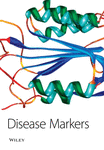Overexpression of Fascin-1 in Advanced Colorectal Adenocarcinoma: Tissue Microarray Analysis of Immunostaining Scores with Clinicopathological Parameters
Abstract
Objective: Fascin-1 is an actin-binding protein that promotes cell proliferation, adhesion and motility. We tested the hypothesis that fascin-1 expression correlates with clinicopathological parameters of colorectal adenocarcinomas.
Methods: Immunohistochemical analysis of fascin-1 was performed in tissue microarrays of 91 surgical specimens, including 32 well, 33 moderately, and 26 poorly differentiated colorectal adenocarcinomas; and in 22 specimens from colorectal adenomas with dysplasia.
Results: Scattered fascin-1 expression was demonstrated in 9 control specimens of normal colonic glandular epithelia. Higher fascin-1 immunostaining scores were significantly associated with advanced dysplasia in colorectal adenomas (mild 4.2 ± 1.3, moderate 13.5 ± 5.3, and severe 22.5 ± 6.7) and high-grade histopathological differentiation of colorectal adenocarcinomas (grade I 88.6 ± 9, grade II 101 ± 11, and grade III 144 ± 13). Higher immunostaining scores of fascin-1 were also significantly associated with advanced T stage (T1: 42 ± 10, T2: 60 ± 12, T3: 108 ± 12, and T4: 142 ± 15). Higher fascin-1 scores were related with more advanced M and N stages of colorectal carcinomas, but not significant correlation.
Conclusions: Higher expression of fascin-1 correlates significantly with tumor grades and TNM stages in colorectal adenocarcinomas and also with levels of dysplastic change in colorectal adenomas.




